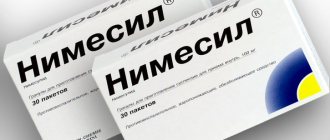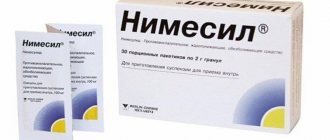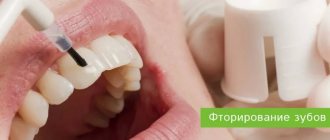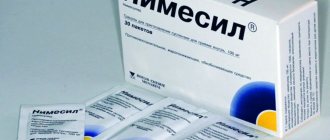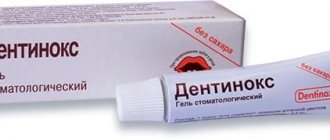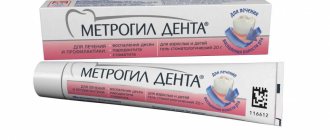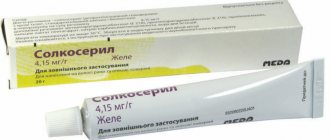What does pain depend on?
How long does the pain last? Localization of pain Pain during implantation Pain during prosthetics How to reduce pain? When to urgently consult a doctor? What to do if your jaw and gums hurt after dental implantation? Is this considered normal and how long can it last? Do I have to endure it? Let's look at it in more detail in our article.
During the implantation of a titanium rod into the bone, a puncture is made in the gums, and tissues and blood vessels are consequently injured, so pain, swelling or slight bleeding is a normal response of the body.
The implantation itself takes place without pain, since the procedure for installing an artificial tooth root is carried out under anesthesia. After its effect ends, sensitivity returns, an aching, throbbing pain syndrome appears, it should go away on the 10th day or earlier.
Indications for taking Nimesil
The action of the product is interconnected with its ability to reduce the sensitivity of pain, reduce fever and eliminate inflammatory processes. The main indications for use of the product include:
- pain in the back,
- joint pain,
- toothache,
- muscle pain of varying severity,
- inflammatory processes in the tendons,
- acute or chronic inflammation of the synovial bursa,
- menstrual irregularities,
- pain during menstruation,
- severe headache.
Why does pain occur after implantation?
Despite the fact that the dental implantation procedure takes place under local anesthesia and you feel almost nothing, it is a traumatic operation and a lot of stress for the body tissues. Therefore, the body releases a large number of various substances to the site of injury, designed to protect the tissue. These same substances strongly irritate the nerve fibers, resulting in a feeling of pain.
In addition, any noticeable damage is accompanied by tissue swelling. This is another natural protective mechanism. As a result of increased tissue volume and increased fluid content, mechanical compression of the nerves occurs. Thus, mechanical and chemical effects on nerve fibers lead to the patient feeling noticeable pain in the surgical area.
Contraindications
- personal intolerance to the ingredients of the product,
- history of reactions to medications,
- taking medications with extremely high toxicity,
- period of renewal of the body,
- reappearance of inflammatory pathologies of the gastrointestinal tract,
- presence of hyperthermia,
- period of exacerbation of peptic ulcer disease in the body,
- the presence of a serious inflammatory process of ulcerative pathology,
- heart failure,
- blood clotting disease
- acute renal and liver failure,
- pathological processes occurring in the liver,
- the period of bearing and feeding a child,
- excessive consumption of alcohol and drugs,
- age category under 12 years old,
- a disease associated with a high risk of bleeding.
The drug should be given more attention when taken in case of the presence of the following ailments:
- diabetes mellitus with complications,
- high pressure,
- chronic heart failure,
- heart attack,
- various types of diseases like Helicobacter pylori,
- cerebrovascular pathologies.
Nimesil granules for suspension 100 mg sachet 2 g 9 pcs ➤ instructions for use
Undesirable side effects can be minimized by using the minimum effective dose of the drug for the shortest possible short course.
Nimesil® should be used with caution in patients with a history of gastrointestinal diseases (ulcerative colitis, Crohn's disease), since exacerbation of these diseases is possible.
The risk of gastrointestinal bleeding, ulceration or perforation of an ulcer increases with increasing doses of NSAIDs in patients with a history of ulcers, especially those complicated by bleeding or perforation, and in elderly patients, so treatment should be started at the lowest possible dose. Patients receiving drugs that reduce blood clotting or suppress platelet aggregation also increase the risk of gastrointestinal bleeding. If gastrointestinal bleeding or ulcers occur in patients taking Nimesil®, treatment with the drug should be discontinued.
Since Nimesil® is partially excreted by the kidneys, its dosage for patients with impaired renal function should be reduced depending on the level of urination.
There is evidence of rare cases of liver reactions. If signs of liver damage appear (itching, yellowing of the skin, nausea, vomiting, abdominal pain, dark urine, increased activity of liver transaminases), you should stop taking the drug and consult your doctor.
Despite the rarity of visual impairment in patients taking nimesulide concomitantly with other NSAIDs, treatment should be stopped immediately. If any visual disturbance occurs, the patient should be examined by an ophthalmologist.
The drug can cause fluid retention in tissues, so patients with high blood pressure and cardiac dysfunction should use Nimesil® with extreme caution.
In patients with renal or heart failure, Nimesil® should be used with caution, as renal function may deteriorate. If the condition worsens, treatment with Nimesil® should be discontinued.
Clinical studies and epidemiological data suggest that NSAIDs, especially at high doses and with long-term use, may lead to a small risk of myocardial infarction or stroke. There is insufficient data to exclude the risk of such events when using nimesulide.
The drug contains sucrose, this should be taken into account by patients suffering from diabetes mellitus (0.15–0.18 XE per 100 mg of the drug) and those on a low-calorie diet. Nimesil® is not recommended for use in patients with fructose intolerance, glucose-galactose malabsorption or sucrose-isomaltose deficiency.
If signs of a cold or acute respiratory viral infection occur during treatment with Nimesil®, the drug should be discontinued.
Nimesil® should not be used simultaneously with other NSAIDs.
Nimesulide can change the properties of platelets, so caution must be exercised when using the drug in people with hemorrhagic diathesis, however, the drug does not replace the preventive effect of acetylsalicylic acid in cardiovascular diseases.
Elderly patients are particularly susceptible to adverse reactions to NSAIDs, incl. the risk of gastrointestinal bleeding and perforations that threaten the patient’s life, deterioration of kidney, liver and heart function. When taking Nimesil® for this category of patients, proper clinical monitoring is necessary.
There is evidence of the occurrence in rare cases of skin reactions (such as exfoliative dermatitis, Stevens-Johnson syndrome, toxic epidermal necrolysis) to nimesulide as well as to other NSAIDs. At the first signs of a skin rash, damage to the mucous membranes or other signs of an allergic reaction, Nimesil® should be stopped.
The effect of the drug on the ability to drive vehicles and operate machinery. The effect of the drug Nimesil® on the ability to drive vehicles and operate machinery has not been studied, therefore, during treatment with the drug Nimesil®, care should be taken when driving vehicles and engaging in potentially hazardous activities that require increased concentration and speed of psychomotor reactions.
Enlargement of wisdom teeth
The growth of wisdom teeth is associated with various pathological processes and pain. Nimesil is used to block them. The product has a preventive effect, reducing the risk of attachment of viral flora. The dose is prescribed by a medical specialist in accordance with the clinical picture.
Symptoms of gingivitis are inflammation of the gums. In this case, you can note blood circulation, pain, swelling and overflow of blood vessels. The effective action of Nimesil makes it possible to use it to eliminate the clinical picture.
Possible side effects
Nimesil in some cases provokes the appearance of many side effects, manifested in the form of:
- Attacks of headaches and dizziness
- Problems with stool
- Nausea and vomiting
- Increased sweating
- Allergic reaction in the form of skin rashes
- Anemia
- Decreased vision
- Increased blood pressure
- Increased nervousness
- Insomnia
- Shortness of breath
- Stomatitis and hepatitis
- Urinary retention
Basically, the negative consequences that occur when taking Nimesil are associated with the functioning of the gastrointestinal tract. Side effects manifest themselves in the form of diarrhea, constipation, pain localized in the abdomen.
Nimesil for colds
Indications for using the drug for colds are:
- increase in body temperature is 37.5 degrees,
- increased sweating,
- pain in muscles and joints,
- nasal congestion,
- hyperemia of the mucous membrane of the throat,
- coughing,
- discomfort in the throat,
- fast fatiguability,
- dizziness.
The antipyretic effect makes it possible to prescribe the drug at fever. The effect itself occurs half an hour after administration and lasts for three to six hours. The dose of the medication is selected individually in accordance with the characteristics of the pathology.
Method of administration
Nimesil is used for tooth pain only after consultation with a doctor and with his direct participation. One of the main advantages that the medicine has is its release form.
The suspension is prepared from powder according to the instructions
Nimesil is produced in the form of a powder intended for the preparation of a suspension. This solution is quickly absorbed, resulting in relief within 30 minutes. During this period, the concentration of the active substance reaches 50% of the maximum possible.
Before you start using Nimesil, it is recommended that you read the attached instructions. The drug is approved for use subject to a number of conditions:
- The patient's age is over 12 years
- The product is taken only after meals
- The prepared solution is not intended for long-term storage
- The powder is dissolved in half a glass of warm water
The drug is taken daily no more than twice a day. At least 12 hours must pass between each dose.
Nimesil after tooth extraction
Nimesil helps eliminate the severity of symptoms during tooth extraction. This greatly improves your health.
By-effect
This includes the following:
- scabies,
- hives,
- high sweating,
- dermatitis,
- excessive redness of the skin,
- in rare cases, anaphylactic shock.
Transformations due to nervous disorders:
- dizziness,
- high degree of anxiety,
- pain in the head,
- drowsiness.
Various blood diseases, visual impairment, pathologies and complications of the cardiovascular system and gastrointestinal tract. Do not forget also about disorders of the respiratory system and urinary system.
nimesil how to take
It is worth noting that taking the medicine together with alcohol-containing drinks should be avoided.
How to Reduce or Prevent Pain During Recovery, Do's and Don'ts
In the postoperative period, the main thing is to strictly follow all the doctor’s recommendations. Basic:
- in the first hours after implantation, do not eat or drink;
- the first days (about a week) eat liquid foods: soups, purees, baby food;
- exclude hot, cold, spicy, alcohol;
- After surgery, apply cold compresses to relieve swelling;
- take prescribed medications strictly according to the schedule. Do not cancel them yourself if you feel better;
- make mouth baths using antiseptics: chlorhexidine, chamomile;
- sleep on a high pillow and on the opposite operating side;
- forget about physical activity for a while;
- Going to bathhouses and saunas is prohibited.
Usually, every dental clinic has a reminder about what is possible after implantation, what is prohibited, how to relieve pain after dental implantation, and a schedule for visiting the doctor.
The doctor will definitely prescribe painkillers - Nurofen, Nimesil, Analgin, Nise, etc. They need to be taken as long as the pain lasts after installing the dental implant, up to 7-10 days. If it persists longer, it is better to contact your dentist.
Note!
The description of the drug Nimesil on this page is a simplified author’s version of the apteka911 website, created on the basis of the instructions for use.
Before purchasing or using the drug, you should consult your doctor and read the manufacturer's original instructions (attached to each package of the drug). Information about the drug is provided for informational purposes only and should not be used as a guide to self-medication. Only a doctor can decide to prescribe the drug, as well as determine the dose and methods of its use.
Analogues of the product
There are dozens of types of drugs on the pharmaceutical market that are structural analogues of Nimesil. The similarity of the therapeutic effect and possible side effects on the body of these drugs is due to a single active component - nimesulide. According to reviews from many people, the result of using these drugs is no different from taking Nimesil. Moreover, many analogues are much cheaper than this analgesic.
Examples of medicines that can be used as a substitute for Nimesil:
- Coxtral tablets;
- Aponil tablets;
- Nimegesic tablets and suspension;
- granulate for preparing Mesulide suspension;
- Novolid tablets;
- Nimulid tablets;
- Prolid tablets;
- Ameolin tablets.
This is a partial list of pharmaceuticals. Every pharmacy has several types of structural analogues of Nimesil. Full information about available substitutes for this analgesic can be obtained from your pharmacist.
You cannot independently choose a drug to relieve pain after tooth extraction. Only a dentist can select an analgesic that will have the maximum therapeutic effect and will not cause harm to the body. In some cases (low pain threshold, strong inflammatory reaction), the doctor may prescribe the use of painkillers that contain another active substance, for example, Ketanov.
Category: Tooth extraction Published by Mister stomatolog
